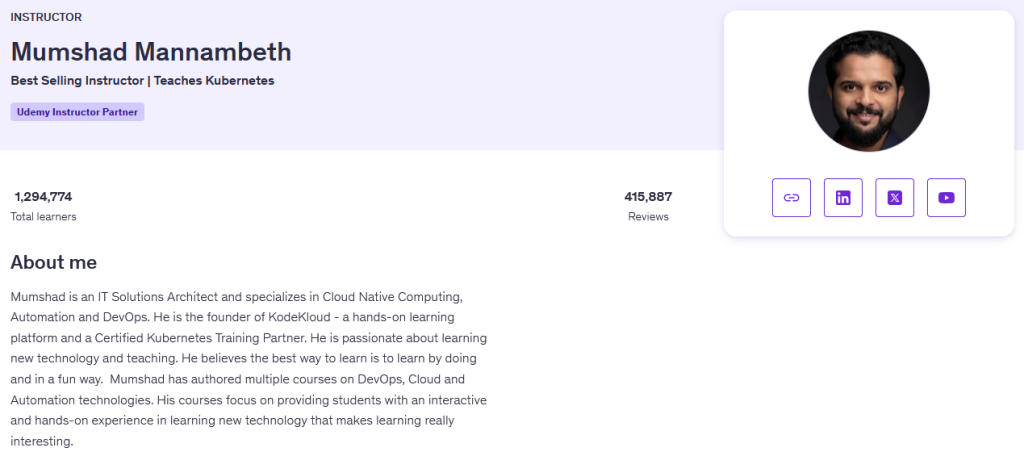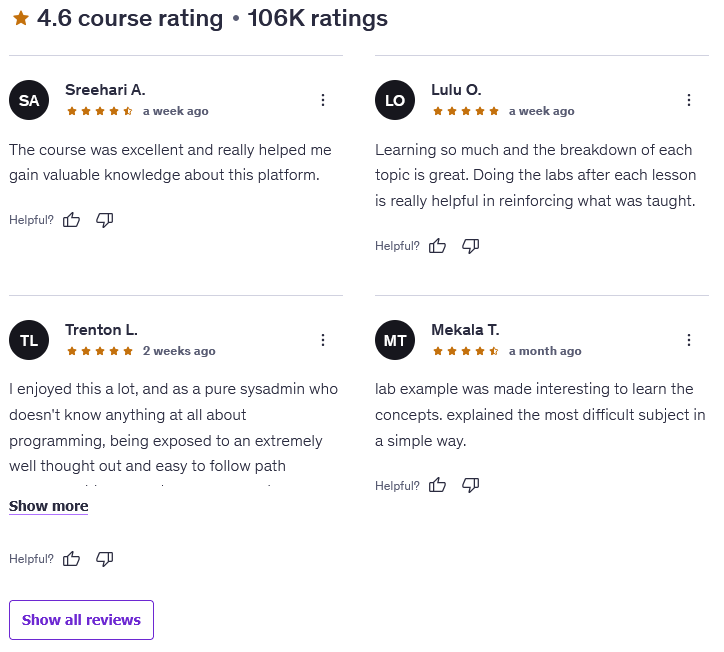If you’ve been meaning to get into DevOps but feel intimidated by Kubernetes, this is the perfect place to start. Kubernetes for the Absolute Beginners – Hands-on is exactly what it sounds like — a practical, beginner-friendly course designed to teach you one of the most in-demand skills in the DevOps world. You’ll not only learn the fundamentals but also get your hands dirty with real exercises and live labs that simulate real-world use cases.
Instructor Reputation
When it comes to online learning, the instructor can make or break a course — and that’s where Mumshad Mannambeth truly shines. He’s one of those rare instructors who not only understands the technology inside out but also knows how to teach it in a way that actually sticks. With more than 1.29 million students and over 415,000 reviews across his Udemy courses, Mumshad has built a global following among aspiring DevOps professionals.

What really sets him apart is his focus on hands-on learning. He doesn’t just talk through slides or theory; he believes the best way to understand something as complex as Kubernetes is to get your hands on it and start building. That’s why nearly every lecture in this course is paired with a lab exercise — a pattern that mirrors his popular KodeKloud platform, which has become one of the leading online environments for DevOps training.
Beyond teaching, Mumshad’s background as an IT Solutions Architect specializing in Cloud Native Computing and Automation gives his lessons a grounded, real-world edge. He’s not teaching from textbooks — he’s teaching from experience. Whether you’re deploying clusters in Google Cloud or designing YAML configurations, you can tell that every concept he covers comes from genuine field knowledge.
He’s also a Certified Kubernetes Training Partner, which adds another layer of credibility. That means he’s recognized by the Cloud Native Computing Foundation (CNCF) — the same organization that oversees Kubernetes itself. This ensures that the content and methodology used in his courses meet professional standards.
Students often mention how Mumshad’s teaching style feels clear, calm, and supportive. Even complex topics like pods, nodes, and replica sets are broken down into simple, digestible steps. One student described him as “the kind of instructor who makes you forget you’re learning something hard.” Another noted that the pace of his lessons allows beginners to build confidence early, which is crucial when tackling intimidating tools like Kubernetes.
Overall, Mumshad’s reputation as a top-rated DevOps instructor isn’t just about popularity — it’s about consistency, clarity, and his ability to turn total beginners into confident practitioners. If you’re new to this space, having him as your guide is like having a mentor who walks you through every command, every deployment, and every small win on your Kubernetes journey.
Course Structure
The structure of Kubernetes for the Absolute Beginners – Hands-on is one of its strongest points. It’s clearly been designed with a true beginner in mind — someone who might have heard of Kubernetes but doesn’t yet know what a “pod” or a “deployment” even is. Instead of overwhelming you with technical jargon, the course starts slow and then gradually layers on more complex ideas once you’ve got a solid foundation.

You’ll move through 10 progressively challenging sections, each with its own set of practical examples and exercises. The early lectures introduce the core Kubernetes architecture — nodes, pods, clusters, and containers — before transitioning into real configuration work. You’ll write your own YAML files, deploy simple applications, and see how everything interacts within the cluster. From there, you’ll move into ReplicaSets, Services, and Deployments, learning how to manage application scaling and ensure high availability — all essential skills for a future DevOps engineer.
What’s particularly thoughtful about the design is how every concept is immediately reinforced through practice. After watching a demo or explanation, you’re prompted to jump into a hands-on lab that tests your understanding. The course uses an interactive browser-based environment, so you don’t even have to set up Kubernetes manually on your machine — it’s all done for you. The system even validates your commands in real time, letting you know whether you executed each step correctly. That immediate feedback loop is what keeps students motivated and prevents you from getting stuck in theory.
Another highlight is how up-to-date the content is. The instructor has maintained a long history of version updates — from v1.18 in mid-2020 all the way to v1.33 in mid-2025. This kind of ongoing support is rare in online courses, especially in tech, where platforms evolve rapidly. You can be confident that what you’re learning reflects the most current Kubernetes environment.
The pacing also deserves credit. While the course moves steadily, it gives you enough breathing room to experiment, make mistakes, and learn from them. If you’ve ever taken a course that rushes through examples without context, you’ll appreciate how this one builds your intuition piece by piece.
Finally, the course wraps up by teaching you how to deploy applications both locally and in the cloud (Google Cloud Platform) — bridging the gap between simulation and real-world deployment. By the time you finish, you’ll not only understand how Kubernetes works, but you’ll also have a working mental model of how to apply it in production-like environments.
In short, the structure of this course perfectly balances learning, doing, and understanding. It’s a guided journey that starts with curiosity and ends with confidence — exactly what a beginner’s course should aim for.
Content Quality
The content in Kubernetes for the Absolute Beginners – Hands-on feels like it’s been crafted with real care — not just thrown together to ride the DevOps wave. Everything from the way concepts are introduced to how they’re reinforced through exercises shows that the instructor genuinely thought about the learning process from a student’s perspective.

Right from the start, you can tell this isn’t a “watch and forget” type of course. Each module builds naturally on the last, guiding you from basic theory into hands-on practice without skipping steps. You’ll start by understanding why Kubernetes exists — what problems it solves — before diving into how to actually use it. This context is invaluable for beginners, because it prevents that “I can follow the commands, but I don’t know what’s happening” feeling that’s common in other tech tutorials.
One of the best parts of this course is how it balances depth with simplicity. Kubernetes can be overwhelming, especially when you’re learning about pods, clusters, and manifests for the first time. But here, the explanations are visual, clear, and filled with practical analogies that help the concepts stick. You’re not buried in abstract technical language; you’re given real-world examples that help you connect the dots between Kubernetes theory and everyday DevOps work.
The hands-on labs are where this course truly shines. Each lab challenges you to apply what you’ve just learned, so the knowledge isn’t theoretical — it’s reinforced through doing. You’ll write YAML configuration files, create and scale deployments, and see your actions reflected immediately in a live Kubernetes environment. The platform even validates your commands, giving you instant feedback when something isn’t quite right. That feature alone makes the course feel interactive and keeps you engaged throughout.
Another standout quality is how current and relevant the content remains. Unlike many courses that get outdated after a single year, this one has a long history of steady updates — with lab environments upgraded regularly from Kubernetes v1.18 in 2020 to v1.33 in 2025. That kind of consistency is rare and shows a real commitment to keeping students aligned with the latest DevOps standards.
Students consistently mention that the course material feels both approachable and rewarding. Beginners with zero prior exposure to Kubernetes find themselves able to complete real deployments by the end, while those with a bit of background in system administration appreciate how the labs simulate realistic DevOps tasks. There’s enough structure to keep novices comfortable, but also enough technical challenge to make experienced learners feel like they’re progressing.
If there’s one minor critique, it’s that some lab explanations can move a little fast. A few reviewers noted having to pause and replay sections, especially during walkthroughs of complex YAML configurations. But honestly, that’s more a reflection of the course’s richness than a flaw — there’s a lot of good material packed in. And since you can rewatch any video or retry any lab, it’s easy to catch up at your own pace.
Overall, the content quality here is outstanding. It’s clear, up-to-date, and engaging from start to finish. You’ll walk away not just knowing what Kubernetes is, but feeling confident enough to actually use it — and that’s the real test of a high-quality course.
Overall Course Rating – 9.5/10
After going through Kubernetes for the Absolute Beginners – Hands-on, it’s easy to see why it’s such a fan favorite on Udemy. I’d rate this course a strong 9.5 out of 10, based on the clarity of instruction, quality of labs, and overall student experience. It’s the kind of course that doesn’t just teach you Kubernetes — it actually helps you think like someone who works with it every day.

What makes this course stand out is how seamlessly it combines structure and practicality. You’re not just told what to do; you’re guided through why you’re doing it, how to troubleshoot, and how to apply those same skills in a real DevOps environment. That’s a level of detail many beginner courses overlook, and it’s what transforms this from a passive learning experience into an active, skill-building journey.
The pacing also deserves credit. Even though Kubernetes can feel like a massive topic to tackle, this course breaks it down into digestible sections that gradually build your confidence. By the time you finish, terms like “replica sets” and “services” won’t sound intimidating anymore — they’ll feel familiar. The inclusion of both local and cloud-based deployments (Google Cloud Platform) gives you practical exposure to different environments, which is a huge plus if you’re planning to work in DevOps professionally.
The interactive validation system within the labs is another underrated gem. It’s like having an automated tutor that double-checks your commands and gently nudges you in the right direction when you slip up. This kind of real-time feedback is what turns learning into mastery, especially for hands-on subjects like Kubernetes.
In terms of polish, the course’s video and lab environments are smooth and professional, and the frequent updates make it feel modern and maintained — not like one of those “set it and forget it” online courses. The instructor’s approachable teaching style ties everything together, giving the whole experience a personal touch. You never feel lost or overwhelmed for long, because the lessons always loop back to practical examples.
If there’s any room for improvement, it might be in adding a bit more explanation for some of the more advanced lab steps. A few students mentioned having to replay certain walkthroughs multiple times. But in a way, that’s a testament to how much you can actually do in this course — it’s not watered down or oversimplified.
In short, this course nails the balance between accessibility and depth. It gives complete beginners the confidence to start working with Kubernetes while still offering enough substance to satisfy learners who want to go beyond the basics. For anyone looking to break into DevOps or get a solid introduction to Kubernetes, this course delivers exactly what it promises — and then some.



